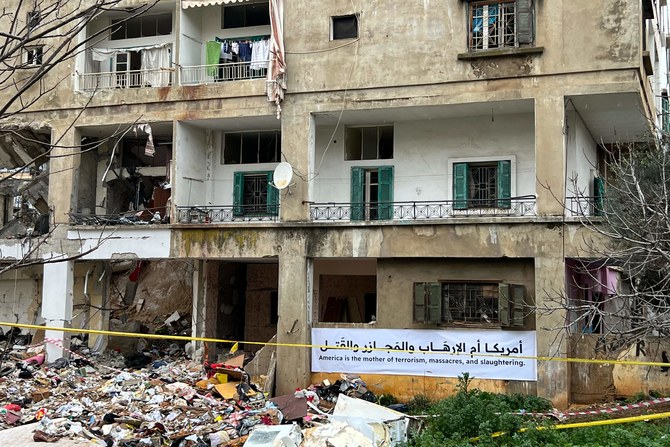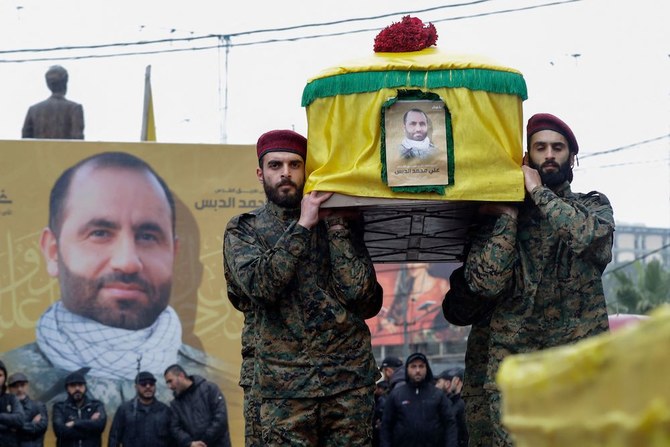BEIRUT: Six Hezbollah and Amal Movement members were killed in an Israeli shelling early Friday morning in southern Lebanon.
Israeli warplanes raided the towns of Qantara, Deir Seryan and the vicinity of Wadi Saluki.
The raid on a house in Qantara killed three Amal Movement members: Ali Hassan Issa from the town of Jibchit, Mohammed Hussein Said from the town of Qsaybeh and Qassem Nizar Berro from the town of Charqiyeh.
Meanwhile, Hezbollah mourned two of its members: Mustafa Khodr Qassir from the town of Deir Qanoun En Nahr and Mohammed Ali Darwiche from the town of Srebbine in southern Lebanon.
The Israeli army acknowledged through its spokesman that on Thursday night, “we attacked a military building and infrastructure belonging to the Hezbollah organization in the village of Qantara.”
Israeli media reported that “the internal front in the north has decided to close roads on the northern border to traffic following the Israeli army’s assessment of the situation, and in anticipation of a response by Hezbollah.”
Hezbollah targeted the Kiryat Shmona barracks at midnight on Thursday with Falaq-1 missiles in response to the massacre committed by the Israeli army in the cities of Nabatiyeh and Al-Sowanah two days ago.
The Civil Defense announced that after continuing search-and-rescue operations and comprehensive field surveys at the site of the building partially destroyed by the Israeli drone in Nabatiyeh on Wednesday evening, they retrieved a total of 11 civilian bodies, transported two wounded to Nabatiyeh Governmental Hospital, and extinguished a fire that broke out inside the targeted building.
While families held funeral processions in the southern villages, Israeli raids continued on Aita Al-Shaab, Beit Lif and Bint Jbeil.
Hostile operations continued for the second consecutive day within the rules of engagement adopted since Hezbollah opened the southern front “to support the Gaza Strip,” meaning south of the Litani River.
This comes after both parties violated these rules two days ago, with the Israeli side targeting Lebanese civilians in the area north of the Litani River, and Hezbollah targeting Safed with its operations.
Commenting on the Nabatiyeh attack, Hezbollah chief Hassan Nasrallah said: “The enemy went too far in killing civilians. Its goal is to put pressure on the resistance to stop, because all pressure since Oct. 7 was aimed at stopping the southern front. The answer to the massacre must be to continue and escalate the action.”
He added: “Targeting the Kiryat Shmona settlement with dozens of Katyusha rockets and a number of Al-Falaq missiles is an initial response.
“The Israeli enemy will pay the price for shedding the blood of our women and children in Nabatiyeh and Al-Sowanah.”
In response to the Israeli defense minister’s threat to the capital, Beirut, Nasrallah said: “It seems that he has forgotten that the resistance possesses a tremendous and accurate missile capability that allows its hand to extend from Kiryat Shmona to Eilat.”
A Lebanese security source said: “The Israeli Army is focusing its hostile operations on cutting off Hezbollah’s supply routes with fire and blocking off the roads connecting the border villages to each other.”
The source noted: “Completely uninhabited areas are witnessing unprecedented destruction of homes and infrastructure. The Israeli army deals with anything moving in the area as a target.”
Israeli reconnaissance planes continue to fly over southern Lebanon, reaching the course of the Litani River.
In a speech delivered during the opening session of the 60th Munich Security Conference, caretaker Prime Minister Najib Mikati affirmed that “Lebanon will continue to adhere to all UN resolutions.”
He said: “Israel should implement these resolutions, stop its hostilities in southern Lebanon and its violation of the Lebanese sovereignty, and withdraw from all occupied Lebanese territory.”
Mikati questioned “the steps taken by the international community to stop this ongoing hostility.”
He said: “Only two days ago, a family of seven, including children and women, was targeted in southern Lebanon. Killing and targeting innocent children, women and elderly people are crimes against humanity.”
Mikati emphasized that “periodic wars and conflicts in the Middle East, along with their global repercussions, will not end without a two-state solution and the establishment of an independent and sovereign Palestinian State.”
Mikati called on “international actors to support peace-making efforts, help to prevent and resolve conflicts, and protect civilians from harm.”
Caretaker Foreign Minister Abdallah Bou Habib instructed Lebanon’s permanent representative to the UN to file a complaint before the UN Security Council on Friday.
This came after “the Israeli raid that targeted a residential building in Nabatiyeh, killing 11, including women and children, and causing extensive damage to the building, in addition to a second raid targeting the house of Lebanese citizen Jalal Mohsen in the Souaneh village, killing his wife and his two children.”
The complaint emphasized that “Israel’s deliberate and direct targeting of civilians in their houses is a violation of the international humanitarian law and a war crime in which all those involved are directly and indirectly subject to international responsibility.”
The complaint added: “The attacks also violated Lebanon’s sovereignty and the security of its territory and citizens, and defied all UN resolutions compelling Israel to stop its violations of Lebanese sovereignty and put an end to its occupation of Lebanese territories, including the Resolution 1701.
“What is concerning is that this escalation comes at a time when international efforts and diplomatic moves intensify to diffuse the situation, and while Lebanon reiterates its rejection of the war and provides a road map for sustainable security in the south.
“This prompts us to urge the international community to exert pressure on Israel to curb its ongoing escalating hostilities and stop the Israeli aggression against Lebanon and its people, in order to avoid the expansion of the conflict and a full-scale destructive regional war that will be difficult to contain.”

























